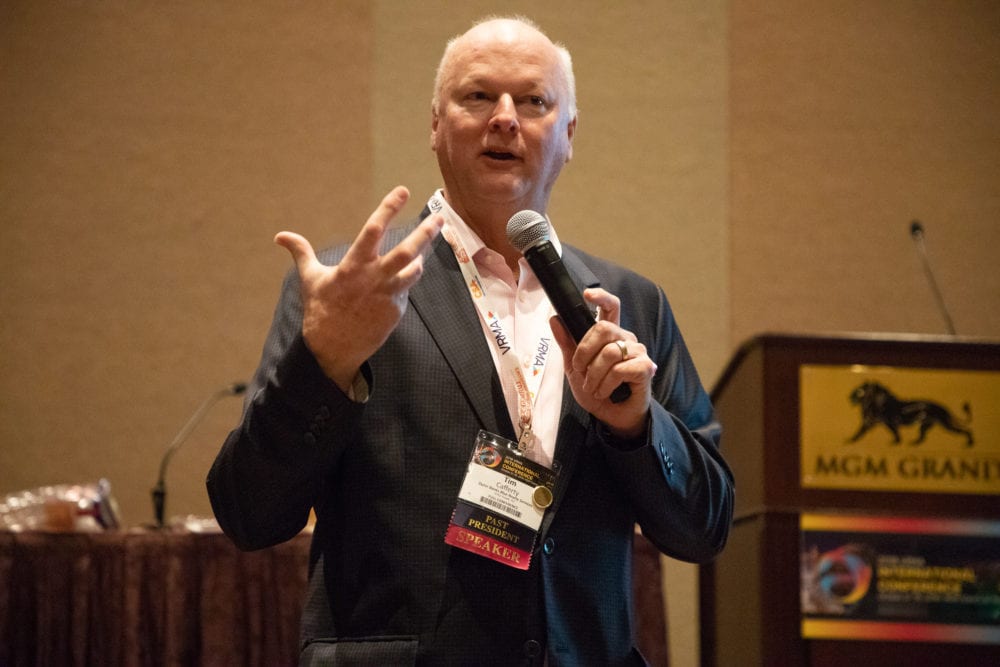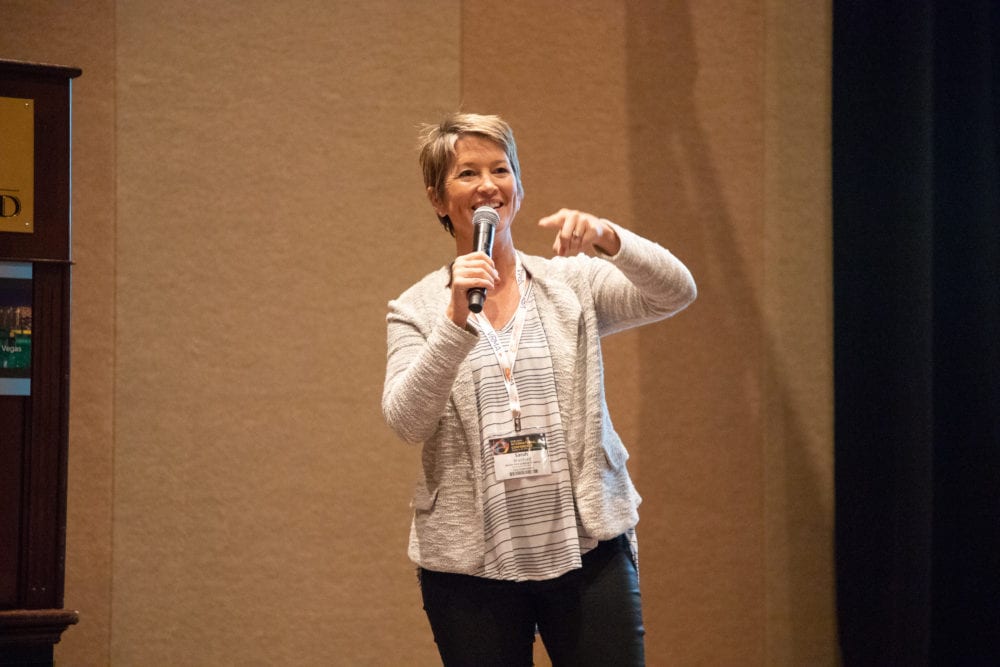
Over the past year and a half, Sarah Bradford and Tim Cafferty have become household names in the vacation rental industry, thanks to their popular podcast, formerly known as Sea to Ski with Sarah and T (more on this later). Each episode has one mission: to give property managers information they can use to make their businesses better.
At the time this article was written, the duo had published 36 episodes over two seasons, covering everything from OTA independence to vacation rental décor to conference takeaways to interviews with other leading figures. Each episode comes packed with insights and “pull-over moments,” nuggets of information important enough for listeners to pull over on their commute and jot down for later, plus recurring segments of “Rapid Fire” Q&As and “Not-So-Hot-off-the-Press” headlines.
The pair’s relatable knowledge, familial banter, and clear passion for the series bubble out of every episode seemingly effortlessly, but behind the scenes, it takes hours of hard work to make each episode happen. One 30-minute episode may take three days to prepare, hours to vet interviewees, an hour to record, and several hours to edit. They dedicate this time on top of their already busy schedules spearheading their own property management companies. Tim owns Outer Banks Blue in the NC Outer Banks and Sandbridge Blue in Virginia Beach, managing 295 and 76 homes, respectively. Sarah owns Winter Park Lodging Company with 153 properties and Steamboat Lodging Company with 20 properties in Colorado.
While Sarah and Tim make no money from the podcast venture, the series has brought significant value to the vacation rental community and its members. Of the 400 to 500 weekly listeners they know about (some podcast apps don’t provide listener stats), many approach them at events to let them know how much they love the series and share their favorite episodes. In the VRMA International Conference takeaways session, where they recorded a podcast live with the audience, one superfan property manager, Sharon Walker of Walker Luxury Vacation Rentals in Austin, shared how much she had wanted to be in the podcast and that she offers a $100 bill to the staff member who listens to a new episode first.
Tim Cafferty recording the 2018 VRMA International Conference recap episode of “Sarah and T”
Soon, new and longtime fans will have to adjust to a change in the episodes ahead: The podcasters have changed the name of the series to simply Sarah and T. In October, the pair received a cease and desist letter from another company in the industry for using the original name and logo in violation of its copyright. “We don’t understand the whys and wherefores, but neither of us have the energy or the dollars to file a federal lawsuit for copyright infringement,” Tim said. “We personally believe that we’re not infringing on anybody and can’t really understand the motivation.”
“I am hurt more than anything,” Sarah said. “All the effort we put into it and the knowledge and everything we’re sharing is in an open and honest spirit . . . It’s silly to me.”
An attorney with the Wrona Dubois Law Firm representing the property management company issued the following statement on behalf of its client: “They’re going to protect their trade name and their trademark. They’ve spent years and years investing in that trade name and trademark, and they’re going to vigorously protect it.”
But despite the blow of the cease and desist letter, it’s clear that Sarah and Tim have no plans to slow down. “We told each other when we started that when it stopped being fun, we’d get off the merry-go-round,” Tim said. “Our rapport is great. I consider her a sister, and she pokes me, I poke her, we make fun. At the bottom line, it’s out of love and respect. I think that’s what makes us successful, and I think people hear that. So as long as that’s the case, we’re going to keep on pressing forward.”
Sarah Bradford recording the 2018 VRMA International Conference recap episode of “Sarah and T”
VRM Intel turned the mic on Sarah and Tim to learn more about how one of the most popular series in the industry came to be and what makes the work worthwhile.
ALEXA NOTA: HOW DID THE PODCAST ORIGINATE?
Tim Cafferty: Sarah and I didn’t really know each other very well. We were introduced by a mutual friend, and we hit it off very well from the start. I was picking her brains on things, and I think she actually listened to a couple of things I said, which is a very big step for her. [They both laughed.] We get along very well. Sarah said something about always wanting to do a podcast, and I said, “Yeah, we ought to do that.” I was serious, and I didn’t know if she was, but I called her a week later and I was like, “I was serious, we’ve got to do that.”
Sarah Bradford: And I was like, “You are? You want to do a podcast?” I thought it was a lot harder to do a podcast than it really turns out to be, although we struggle with the audio sometimes, and you know you have to have the right technical equipment. I think that Tim and I are passionate about this industry. We’ve done this for a while. We’re passion about sharing, and instead of always having to have someone come to a conference and sit in a room and happen to listen to us or share ideas, we thought this was another interesting forum and a way to share best practices in the industry.
AN: HAD EITHER OF YOU DONE ANYTHING LIKE PODCASTING BEFORE?
TC: I have a master’s degree in journalism, broadcast journalism, from the University of North Carolina. I worked for the Tar Heel Radio Network for four years, then I went to NBC Sports and Mutual Broadcasting System and found out when I was 23 that it’s a great hobby but not a great career. And also I have a face made for radio. TV didn’t work out. So, when I was 22–23, I was living out of a suitcase, traveling around the country doing Final Four reports or covering the Masters. I was doing the 5:25 sportscast on NBC, which taught me about promptness, because the 5:25 sportscast starts at 5:25 whether or not you’re there. So, I had some background in radio editing, things like that, and it all came back pretty well once we did this. I’ve also broadcast high school football games for the past 35 years.
SB: I have no experience. I was just a high school teacher at one point.
AN: HOW DO YOU DECIDE WHAT TOPICS TO COVER?
SB: Whatever I want to do. (I’m kidding.) You know, I would say one thing is when we started doing the podcast, we would talk about a specific topic, and then we’d go off on a tangent and say, “Oh my gosh, we have to do a whole other podcast on that.” So, it’s almost like the topics have evolved as we’ve talked about other topics.
TC: Well, I do think we typically have a plan, and we will talk about it. At one point we had a call every week. We talk about where we think we ought to go. She’s correct; as we’ve gotten into things, we find we need to do a whole podcast on that. As I was driving across the state, I listened to some of the old stuff, and I can hear when we mentioned something, and then we actually did another podcast on it.
Of course, we’ve changed the format. This year we’ve done more interviews, and we’ve done a lot of vetting on that. What do you think of this guy? Is he going to be entertaining? Can he be fun? Can he give you short, punchy answers? Not every idea we’ve come up with and not every person we’ve thought of has made the cut. I don’t think it would be as entertaining, which is part of it as well. There’s certainly an informational factor that we want to get in there, but there also needs to be an entertainment factor.
SB: The other thing I’d say is we’ve had some listeners suggest topics, and then we’ve done those topics. And we try try try to keep it at 30 minutes, what would be someone’s commute, ideally, that they’re listening to in the car. Also, we really, really try to make the podcast have a lot of meaty content with takeaways that someone wants to listen to again. [We want to] have specific things they could do in their business versus just discussing, “I don’t know, what do you think of Airbnb? Blah blah blah.” What can you do with this information to make your business better?
AN: WHAT DID YOU PICTURE FOR THE PODCAST WHEN YOU STARTED? LOOKING BACK 18 MONTHS ON, HAS IT MET YOUR EXPECTATIONS?
SB: I wish I could tell you we had a grandiose vision. I personally didn’t. I just thought, “Let’s try this,” and we have not put much money into it all. We’ve made zero money, to be clear. And we have really been surprised by how many people are listening. I am personally surprised. I have strangers come up to me at the conferences specifically saying, “Oh my gosh, I’ve listened to every single one of your podcasts.” And that’s kind of crazy. That’s how famous people feel, I guess. It’s been pretty exciting to see the adoption of listeners.
TC: That’s happened to me over the course of this year. Just today [at an event], I’ve had five people come up to me I’ve never seen in my life and say they listen to every podcast and can’t wait for the next one.
SB: In fact, just now at work, one of my staff members came up and said they just got off the phone with one of my owners . . . and he’s listening to every podcast, and he loves it and thinks that “Sarah just totally knows what she’s doing!” And I’m thinking, “Oh my God, what have I said that that owner heard?” Even our owners are listening. It’s kind of crazy.
TC: It is. It was interesting—at first, we thought the only people listening were our competitors, but that’s proven not to be the case.
AN: HOW HAS THE FACT THAT YOUR COMPETITORS ARE LISTENING INFLUENCED YOUR DISCUSSIONS?
TC: I think we’ve been wide open from the start.
SB: For the most part, I have found that, competitors or noncompetitors, this podcast has made other companies want to share with us. So, I’ve gained personally and professionally, too. Professionally, people are sharing ideas and thoughts and things with us, because when you share, the natural response is to share back. I would say it’s made my relationship with competitors stronger.
AN: WHAT ARE YOUR FAVORITE EPISODES?
TC: Sarah and I were together in Chicago one time, and we had spent a long day on some professional development. I said, “We’ve really got to record a podcast,” and she said, “I don’t know if I can do this.” So, I went and got a bottle of rum.
SB: Oh, yeah!
TC: So, we did one episode pretty much in the tank.
SB: I forgot about that!
TC: It was a lot of laughs on that one. And then my second favorite one was the one we did in the back of an Uber. That was also in Chicago, actually.
SB: Yeah, we even interviewed the Uber driver. My favorite is a serious one, the John DiJulius one because I love him almost as much as I love Tim. He just dropped so many good knowledge nuggets, it was hard to even write fast enough.
RAPID FIRE
AN: WHAT PULL-OVER MOMENT HAS STUCK WITH YOU MOST?
SB: Mine is that your employees are not born with service aptitude; you have to teach them.
TC: Mine would be anything Clark Twiddy said.
AN: WHAT’S YOUR FAVORITE WEEK OF THE YEAR IN EACH OF YOUR MARKETS?
SB: May 15th.
TC: Mine would be the last week of July, because we are full, and we are hummin’ as a company.
SB: So that shows how different Tim and I are, because May 15th is the deadest week for us.
AN: WHAT’S AT THE TOP OF YOUR TRAVEL BUCKET LISTS?
TC: Australia.
SB: Skiing in Japan.
AN: IF YOU HAD ONE PIECE OF ADVICE FOR OWNERS, WHAT WOULD YOU WANT THEM TO KNOW?
TC: It’s a business, not your home.
SB: Bears on any décor on the property are tacky! But honestly, I want them to know how dedicated and focused and hardworking we are as we try to rent their home better than anybody else could rent it. I think that they can’t always see that, and it kills me.










RSS